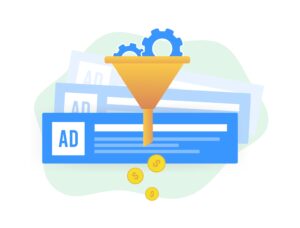
PPC draining your budget? Here’s why and ways you can fix it

Find yourself spending more and more on PPC? Is your budget solely going towards trying to gain visibility for your eCommerce site and paid ads? Enough is enough! You can still get the most out of PPC by working smarter with your budget. But why actually is PPC going up and up in cost? We’re here to help.
You can navigate this upward slope of spend and still have an effective PPC strategy in place. We promise, it’s possible. In this blog, you can find out how to fix these reasons and how to navigate the competition. You shouldn’t just resort to abandoning the PPC ship- instead, you can learn to sail it and take back control of your spend.
Why is PPC getting more expensive?
PPC is a highly competitive landscape, so it’s no wonder you may find yourself spending more just to gain that vital ad visibility. When entering the ad auction, because of ad rank, PPC consultants may think increasing bid amount is the move. This isn’t always the case, but people often assume that fighting for top ad placement equals increasing your spend.
The CPC (cost per click) may also be increasing for you. This could be down to multiple things, such as competition, decreased ad space, quality score and larger displays of ads. It’s also very easy to spend a lot of money on PPC in just a little amount of time as people just want those fast results. Using guesswork and a desire for a quick outcome shouldn’t be the way to guide your strategy, especially in times of economic uncertainty and inflating expenses.
Areas to target

To prevent wasted spend and optimise your budget, there are a few areas you can target. To fix your drained budget, here is what you could focus on:
Keywords
Ah, keywords. As they sit at the heart of any campaign, there’s so much to be said for them. And credit to them for the role they play in strategies. However, they could be draining your budget in ways that you don’t yet realise. The three areas of keywords that could be targeted are:
- Negative keywords
- Non-converting keywords
- Branded keywords
Let’s begin with negative keywords. This type of keyword essentially makes sure you don’t rank for irrelevant keywords, therefore preventing unnecessary clicks onto your site. That way, you’re only ranking for words that are linked to your business. Customers who aren’t likely to turn a click into a conversion therefore cost you wasted clicks. Implementing negative keywords helps prevent this issue.
Next are non-converting keywords. These are keywords that fail to generate any revenue or little revenue in comparison to high converting keywords in your campaign. Non-converting keywords are best being paused if it isn’t a word integral to your business. Replacing with words that are likely to drive clicks or just removing them altogether is probably the best practice for your strategy. By doing this, you aren’t draining your budget on keywords that don’t even make any money for your business.
Finally, it’s worth looking at branded keywords. These are keywords that include the name of your exact brand, business or product. They are specific to you as a service. Depending on the situation, bidding for branded keywords can help protect your brand, or it can be a waste of spend. It really depends on how low your budget is or whether your brand actually needs protecting. If your brand is something generic, it may be worth bidding to increase visibility for this work.
Data and settings

Monitoring your campaign regularly means you can leverage the data to make informed decisions about the direction of your budget. Whatever your KPI may be, gather the data that relates to this and you can determine whether investment or an increase of budget is needed. Making the most of your spend is key, and data can tell you whether you are.
As for settings, sometimes Google’s default settings aren’t actually optimal for the goals of your campaign. For example, you may not be wanting to show your ads on the display network, yet Google automatically sets it. Therefore, turning it off could have a positive impact on your budget. Additionally, your settings should align with your ideal customer persona so they can be effectively targeted. Scheduling also comes in handy- this makes sure there’s no wasted spend for displaying ads when your business isn’t even active.
The auction
It’s likely that the auction is often where a lot of your budget will sit. Therefore, it’s essential to adjust your bids in a way that will optimise your spend. Automated bidding strategies can help with your auction because you’re telling Google what your goals are, and the smart bidding should work alongside these.
Utilising smart bidding also means you can adjust it to suit your aim whether that be maximising clicks, getting that top spot on the SERPs or gaining maximum conversion. It’s also worth checking your overall ad quality- if you’ve churned out a badly written ad, then it’s likely to receive less clicks. As a result, your CPC will increase because of the auction.
Final thoughts
So, PPC is a competitive field, but there’s ways to navigate it that will optimise your budget. Hopefully you’ve gained helpful insight into why PPC may be increasing for some people, and the areas that you can target to curb wasted spend.
If you’re still worried about the amount you’re spending, you can speak to a member of our expert team. Or, if you just have a question about digital marketing, feel free to get in touch- we’d be happy to help!
